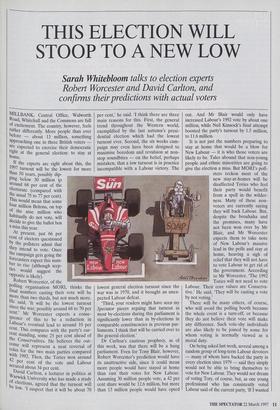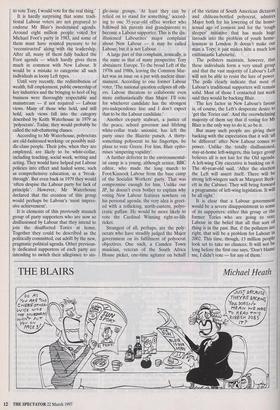THIS ELECTION WILL STOOP TO A NEW LOW
Sarah Whitebloom talks to election experts
Robert Worcester and David Carlton, and confirms their predictions with actual voters
MILLBANK, Central Office, Walworth Road, Whitehall and the Commons are full of excitement. The country, however, feels rather differently. More people than ever before — about 13 million, something approaching one in three British voters are expected to exercise their democratic right at the general election: to stay at home.
If the experts are right about this, the 1997 turnout will be the lowest for more than SO years, possibly dip- Ping below 30 million Co around 68 per cent of the electorate (compared with the usual 75 to 77 per cent). This would mean that some four million Britons, on top of the nine million who habitually do not vote, will decide to give the ballot box a miss this year. At present, just 66 per cent of electors questioned by the pollsters admit that they intend to vote. Once the campaign gets going the forecasters expect this num- ber to rise (although scep- tics would suggest the opposite is likely). Robert Worcester, of the polling organisation MORI, thinks the final numbers casting their vote will be more than two thirds, but not much more. He said, 'It will be the lowest turnout since the war; possibly around 68 to 70 per cent.' Mr Worcester expects a conse- quence of this to be a reduction in Labour's eventual lead to around 10 per cent. This compares with the party's cur- rent standing, some 25 per cent ahead of the Conservatives. He believes the out- come will represent a neat reversal of roles for the two main parties compared with 1992. Then, the Tories won around 42 per cent of the vote and Labour secured about 34 per cent. David Carlton, a lecturer in politics at Warwick University who has made a study of elections, agreed that the turnout will be low. suspect that it will be about 70 per cent,' he said. 'I think there are three main reasons for this. First, the general trend throughout the Western world, exemplified by the last autumn's presi- dential election which had the lowest turnout ever. Second, the six weeks cam- paign may even have been designed to maximise boredom and revulsion at non- stop soundbites — on the belief, perhaps mistaken, that a low turnout is in practice incompatible with a Labour victory. The lowest general election turnout since the war was in 1970, and it brought an unex- pected Labour defeat. `Third, your readers might have seen my Spectator pieces arguing that turnout in most by-elections during this parliament is significantly lower than in by-elections in comparable constituencies in previous par- liaments. I think that will be carried over to the general election.' Dr Carlton's cautious prophecy, as of this week, was that there will be a hung parliament. Even for Tony Blair, however, Robert Worcester's prediction would have its unattractive side, since it could mean more people would have stayed at home than cast their votes for New Labour. Assuming 30 million people vote, a 42 per cent share would be 12.6 million, but more than 13 million people would have opted out. And Mr Blair would only have increased Labour's 1992 vote by about one million, while Neil Kinnock's final attempt boosted the party's turnout by 1.5 million, to 11.6 million.
There will be many others, of course, who will avoid the polling booth because the whole event is a turn-off, or because they do not believe their vote will make any difference. Such vote-shy individuals are also likely to be joined by some for whom voting is normally viewed as a moral duty.
On being asked last week, several among a random group of long-term Labour devotees — many of whom have backed the party in every election since 1979 — said they simply would not be able to bring themselves to vote for New Labour. They would not dream of voting Tory, of course, but, as one young professional who has consistently voted Labour said of the current party, 'If I wanted to vote Tory, I would vote for the real thing.'
It is hardly surprising that some tradi- tional Labour voters are not prepared to endorse Mr Blair's modernised agenda. Around eight million people voted for Michael Foot's party in 1983, and some of them must have resisted pressure to be `reconstructed' along with the leadership. After all, many of them fully backed the Foot agenda — which hardly gives them much in common with New Labour. It would be a mistake to categorise all such individuals as loony Left types.
Until very recently, the redistribution of wealth, full employment, public ownership of key industries and the bringing to heel of big business were thoroughly respectable and mainstream — if not required — Labour views. Many of those who held, and still hold, such views fall into the category described by Keith Waterhouse in 1979 as `polyocrats'. Today, they would probably be called the sub-chattering classes.
According to Mr Waterhouse, polyocrats are old-fashioned working- or possibly mid- dle-class people. Their jobs, when they are employed, are likely to be white-collar, including teaching, social work, writing and acting. They would have helped put Labour policies into effect and hailed some, such as comprehensive education, as a 'break- through'. But even back in 1979 they would `often despise the Labour party for lack of principle'. However, Mr Waterhouse declared that the creation of this group would perhaps be Labour's 'most impres- sive achievement'.
It is elements of this previously staunch group of party supporters who are now so disillusioned by Labour that they intend to join the disaffected Tories at home. Together they could be described as the politically committed, cut adrift by the new, pragmatic political agenda. Other previous- ly dedicated supporters of each party are intending to switch their allegiance to sin- gle-issue groups. 'At least they can be relied on to stand for something,' accord- ing to one 35-year-old office worker who followed his parents and grandparents to become a Labour supporter. This is the dis- illusioned Labourites' major complaint about New Labour — it may be called Labour, but it is not Labour.
A large part of this complaint, ironically, is the same as that of many prospective Tory abstainers: Europe. To the broad Left of the 1970s and 1980s, leaving the Common Mar- ket was an issue on a par with nuclear disar- mament. According to one former Labour voter, 'The national question eclipses all oth- ers. Labour threatens to collaborate even more enthusiastically than Major. vote for whichever candidate has the strongest pro-independence line and I don't expect that to be the Labour candidate.'
Another ex-party stalwart, a justice of the peace, school governor and lifelong white-collar trade unionist, has left the party since the Blairite putsch. A thirty- something polyocrat to his fingertips, he plans to vote Green. For him, Blair epito- mises 'simpering vapidity'.
A further defector to the environmental- ist camp is a young, although senior, BBC editor, who made the long march to Foot/Kinnock Labour from the base camp of the Socialist Workers' party. That was compromise enough for him. Unlike our JP, he doesn't even bother to explain why voting New Labour features nowhere on his personal agenda; the very idea is greet- ed with a rollicking, north-eastern, polyo- cratic guffaw. He would be more likely to vote the Cardinal Winning right-to-life ticket.
Strangest of all, perhaps, are the poly- ocrats who have steadily judged the Major government on its fulfilment of polyocrat objectives. One such, a Camden Town musician, veteran of the South Africa House picket, one-time agitator on behalf of the victims of South American dictators and chateau-bottled polyocrat, admires Major both for his lowering of the homo- sexual age of consent and for the 'rough sleeper' initiative that has made huge inroads into the problem of youth home- lessness in London. It doesn't make our man a Tory; it just makes him a much less enthusiastic Labourite.
The pollsters maintain, however, that these individuals form a very small group and that the vast majority of Labour's Left will not be able to resist the lure of power. The polls clearly indicate that most of Labour's traditional supporters will remain solid. Most of those I contacted last week said they would be backing Blair. The key factor in New Labour's favour is, of course, the Left's desperate desire to `get the Tories out'. And the overwhelming majority of them say that if voting for Mr Blair is the only way to do it, so be it.
But many such people are giving their backing with the expectation that it will 'al] be different' after New Labour comes to power. Unlike the totally disillusioned, stay-at-home left-wingers, this larger group believes all is not lost for the Old agenda. A left-wing City executive is banking on it. The 40-year-old said, 'After the election the Left will assert itself. There will be strong left-wingers such as Margaret Beck- ett in the Cabinet. They will bring forward a programme of left-wing legislation. It will be all right.'
It is clear that a Labour government would be a severe disappointment to some of its supporters: either this group or the former Tories who are going to vote Labour in the belief that all that sort of thing is in the past. But, if the pollsters are right, that will be a problem for Labour in 2002. This time, though, 13 million people look set to take no chances. It will not be long before the first one says, 'Don't blame me, I didn't vote — for any of them.'



































































 Previous page
Previous page